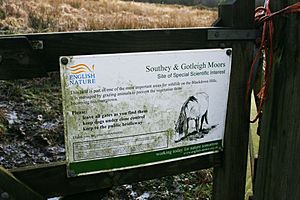Southey and Gotleigh Moors facts for kids
| Site of Special Scientific Interest | |
 |
|
| Area of Search | Somerset and Devon |
|---|---|
| Coordinates | 50°53′34″N 3°09′01″W / 50.89281°N 3.15020°W |
| Interest | Biological |
| Area | 81.3 hectares (0.813 km2; 0.314 sq mi) |
| Notification | 1998 |
Southey and Gotleigh Moors is a very special place in Somerset, England. It's known as a Site of Special Scientific Interest (SSSI), which means it's protected because of its unique plants, animals, or geology. This SSSI covers about 81.3 hectares (that's like 200 football fields!) and was officially recognized in 1988. It's located in the beautiful Blackdown Hills.
Contents
What Makes Southey and Gotleigh Moors Special?
This area is a mix of different wet habitats, making it a fantastic home for many creatures. Imagine a puzzle made of different types of land, all fitting together perfectly.
Diverse Habitats
Southey and Gotleigh Moors has several important types of land:
- Valley mire: This is a type of bog or wetland found in valleys. It's usually very wet and spongy.
- Acid-marsh grassland: This is grassy land that is also wet and has acidic soil. Special grasses and plants grow here.
- Alder-birch carr: This is a type of wet woodland where trees like alder and birch grow. It's often flooded for parts of the year.
These different habitats create a rich environment. They provide food, shelter, and breeding grounds for many different species.
Water and Wildlife
The Bolham River flows through Southey and Gotleigh Moors. There are also small pools of standing water. These water sources are very important for the wildlife living here.
Amphibians and Insects
The wet areas and the river are perfect for amphibians like frogs and newts. They also attract many different invertebrates, which are animals without backbones, like insects and spiders. These small creatures are a vital part of the food chain.
Rare Leaf Beetle
One of the most exciting finds at Southey and Gotleigh Moors is a very rare insect called the leaf beetle (Phyllobrotica quadrimaculata). This beetle is considered "nationally scarce," meaning it's hard to find in the rest of the country. Its presence shows how important this protected area is for keeping rare species safe.
 | Stephanie Wilson |
 | Charles Bolden |
 | Ronald McNair |
 | Frederick D. Gregory |

